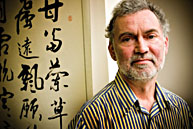Teaching alternative medicine
In 2000, Jean-Paul Collet, a professor of epidemiology at McGill, was attending a conference in China when he encountered a style of medicine that would influence the course of his research.

Epidemiology professor Jean-Paul Collet
Claudio Calligaris
He saw conventional doctors administering traditional therapies such as acupuncture, massages and herbs along with modern treatments. He now believes Canadians could benefit from such an integrated health care system where complementary and alternative medicines (CAM) are used in conjunction with conventional drug therapy.
Intrigued by what he had observed in China, Collet returned six times to develop methods of evaluation for traditional Chinese medicine. This introduced him to a different philosophy toward health and health care.
Over the last century, there have been major advancements in modern science. While Collet believes this progress has been beneficial to society, he says something was lost along the way.
"In the past, there was a more global approach to health," he explains. "The individual was considered as part of an environment, and while knowledge about disease itself was limited, earlier medical practitioners were able to assess the influences of the environment on disease and the impacts disease had on its environment." As Collet puts it, modern medicine is "disease-centred," whereas traditional approaches like Chinese medicine or Ayurveda are more "patient-centred."
That said, Collet cautions against diminishing the importance of conventional drug therapy. Having received two lung transplants, he himself has benefitted immensely from high-tech treatment. But he also believes that modern medicine alone was not sufficient to ensure his successful recovery. Although he did not use any specific complementary or alternative treatments, he claims that having an environment that was conducive to recovery was very important in his case. Hence to Collet, CAM does not refer to any specific type of remedy, but to environmental factors that optimize the patient's functioning.
Collet argues that 50 percent of North American patients already seek out and use CAM. As such, it would be important for medical practitioners and researchers to begin to understand and evaluate these treatments. To emphasize his point, he refers to a recent issue of the British Journal of Medicine, in which physicians express their embarrassment over their lack of knowledge about the alternative remedies used by their patients. Collet makes it clear that it is not a matter of promoting the use of CAM over conventional drugs: "It is a reality, so it is important for us to study it instead of trying to fight it," he states.
Asked whether he considers his work to be revolutionary, he answers that Canada as a country currently plays a leading role in researching CAM. Furthermore, according to Collet, much of this research is conducted at McGill University. Unfortunately, students in the health sciences at McGill would not be aware of this: this avant-garde approach is not yet reflected in the university's curriculum. But Collet is hopeful that this is slowly changing.
One small step is that Collet will be teaching a course this summer on methods of evaluation for CAM. Among other things, the course will examine the direct and indirect effects of CAM in medicine and deal with issues of safety and efficacy in the use of these treatments.
It is officially offered to graduate students, but Collet encourages undergraduates to inquire about taking the course. "We would like to open it to as many students as possible" he says.
